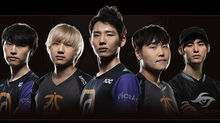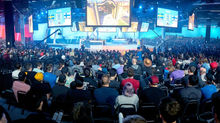Why esports ARE real sports: Video gamers' talents compare with those of athletes and their tour
- Play4Win - Admin

- Aug 26, 2017
- 5 min read
For centuries, crowds have gathered to watch sporting events. The thrill of watching the world's greatest athletes compete compares to nothing else. However, with esports continuing to rise, traditional sports are faced with a new rival.

Esports events are selling out arenas and stadiums around the world. The SSE Arena in Wembley has repeatedly been filled by League of Legends and Counter Strike: Global Offensive events.
And these tournaments are already moving to bigger venues, the League of Legends World Championship final later this November will take place in the Beijing National Stadium which can hold up to 91,000 people.
The meteoric rise of esports has already captured the interest of many sporting organisations. Premier League football teams Manchester City and West Ham have joined European giants such as Paris Saint-Germain, Wolfsburg and Valencia in signing esports stars to represent them in tournaments of the popular football game, FIFA.
And some football clubs have taken an even bigger step into esports by moving away from the football theme altogether. PSG and Schalke both own League of Legends teams and Copenhagen own the Counter Strike team 'NORTH'.
Sports teams in North America have followed suit with NBA teams Sacramento Kings, Golden State Warriors, Philadelphia 76ers and Milwaukee Bucks who have all invested in League of Legends teams, the latter paying £2million for their roster.

In addition to that, earlier this week it was announced that all 32 NFL teams will compete in an online Madden Championship in which the winner will receive two tickets to Super Bowl LII by playing the long-running American football video game.
And if that wasn't enough, there is a possibility that esports tournaments will be added to the 2024 Olympics. Esports have already been added as medal events to the 2022 Asian Games.
However, International Olympic Committee president Thomas Bach has already stated that esports are 'contrary to Olympics rules and values of sport' but will he be able to resist capitalising on the lucrative, young esports audience for much longer?
One person who gave into temptation was ESPN president John Skipper. In late 2014 he dismissed esports in an interview stating: 'It's not a sport, it's a competition. Chess is a competition. Checkers is a competition. Mostly, I'm interested in doing real sports.'
However, just over a year later, he had a change of heart as ESPN announced a dedicated esports news section on their website.
And it was his website that produced an article that some argue, helps to legitimise esports stars as 'athletes'.

They had League of Legends player, Eugene 'Pobelter' Park, take the Wonderlic test which assesses NFL draft prospects' cognitive ability to quickly problem-solve. Unlike the NFL hopefuls, Park was not warned about the test beforehand yet he outscored every quarterback in the draft with a score of 41/50.
Professor Ingo Frobose at the German Sports University conducted a study on esports 'athletes' and was impressed by 'the demands placed on the motor skills and their capabilities'.
'The esports athletes achieve up to 400 movements on the keyboard and the mouse per minute, four times as much as the average person. The whole thing is asymmetrical, because both hands are being moved at the same time and various parts of the brain are also being used at the same time,' he added.
He also acknowledged the complexity of the games add an extra layer: 'In addition to the motor skills required, the games require a high degree of tactical understanding for an athlete to defeat his opponent.'
With gamers competing with potentially millions on the line, did you really think it would be easy? Players can train up 14 hours a day and many teams have coaches.
Some of these coaches come from a sporting background, take for example KC 'Woodbuck' Woods. He stands at six feet three inches and is very athletic, he isn't your stereotypical gamer.
He coached baseball, basketball and volleyball at high schools and has worked with famous NFL coaches but turned his hobby of video gaming into his profession as he became the coach of one of North America's biggest League of Legends teams: Team SoloMid.
He found out the hard way that a lot of his traditional coaching methods didn't transition into esports.
'The players I have coached at a high level in traditional sports have been consistently in team environments since they were a kid, they know how to interact with team-mates, how to be coached, they understand how to play under pressure or they understand a game at a high level. But in esports for the most part, the reason they're really good at video games is because they have been sitting at their computer playing video games since they were a kid.
'They don't necessarily know how to act in a team environment, how to get coached. Even how to play team League of Legends. You have traditional sports you play since a kid so you understand the overall strategy but with League of Legends, you have a player who comes from an online environment to competitive, it's the same game but played in a totally different style that they have never played before.'
Coaches also have to be wary of their players picking up injuries. Playing video games may not sound threatening but sitting at a desk all day can be bad for your posture and many players suffer from carpal tunnel injuries - a painful disorder of the wrist and hand - which affects their ability to play.
There's more strain and skill required from esports stars than you would expect but it's still difficult to label them as athletes. You don't have to be in peak physical condition to be an esports star, it requires little athleticism.
Esports are competitive with a huge viewer base but it's difficult to label them as sports. However, that doesn't bother most people in the esports industry. They're happy with esports being considered a different entity.
Take for example Paul Chaloner from Code Red Esports, who has commentated on esports events for 15 years but couldn't care less how esports are labelled: 'A lot of people will ask, is it a sport? I don't care. Is it competitive? Yes. Is it entertaining? Yes. Do people pay to come and watch it? Yes.
'I always say it's the same as paying money and going to a stadium to watch Cristiano Ronaldo. You know he's just playing football and it's the same football you play down the park but you know that he can somehow do things with the ball that you can only dream of, esport stars are no different. It's very similar in how it makes us feel but of course you have to know the game, you have to understand the game itself.'
You may not be familiar with the games yet but there are plenty of things in esports that traditional sport fans can relate to. Comebacks, underdogs, elite performers competing in front of a pumped up crowd with trophies and millions of pounds at stake, what's not to like?













































Comments